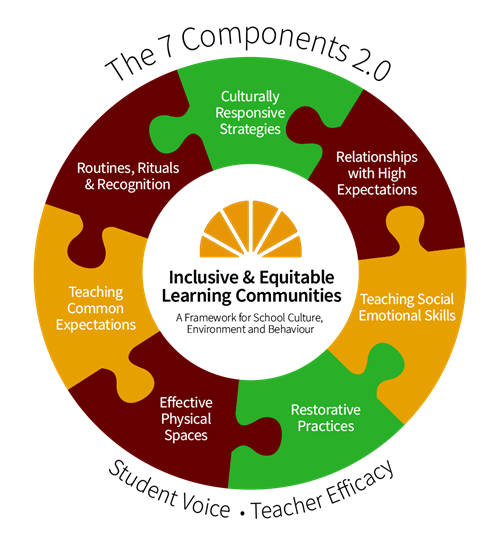- West Linn - Wilsonville School District
- Inclusive Classrooms and Behavior Support
Student Services
Page Navigation
Inclusive Classrooms and Behavior Support
-
Guiding Principles
In the West Linn-Wilsonville School District, we believe that all students belong.
The evidence from 30 years of educational research shows that all students do better in inclusive settings - including students with and without disabilities.
We are committed to creating equity and inclusivity throughout our learning communities.
Promoting inclusive and equitable classrooms involves 7 key components:
- Effective Physical Spaces
- Teaching Common Expectations
- Engagement Strategies
- Teaching Social-Emotional Skills
- Relationships with High Expectations
- Routines, Rituals and Recognition

- Restorative Practices
Resources
Positive School Communities and Restorative Practices
7 Components | Vision and Guiding Questions
7 Components | Teacher Self-Reflection
7 Components | Student Input Interview
Documents generated by teachers during Inclusive Classrooms & Behavior Workshops - 2017-18
Building Teacher-Student Relationships
Tools for Teaching Social-Emotional Skills
What we CAN control to support students in Inclusive Classrooms
Responding to Anxious Behaviors - Avoiding Escalations
Handouts and Readings used during Inclusive Classrooms & Behavior Workshops - 2017-18
Workshop #1 - Effective Physical Spaces and Teaching Common Expectations
Classroom Organization: The Physical Environment - article from Scholastic.com
A Place for Learning: The Physical Environment of Classrooms - article from Edutopia
Classroom Expectations Self-Assessment
Workshop #2 - Relationships with High Expectations and Rituals, Routines & Recognition
Teacher-Student Relationships - Hattie Article
Rituals for a Peaceful Classroom Climate
Warm Demander Article - from Culturally Responsive Teaching and the Brain by Zaretta Hammond
Warm Demander Chart - from Culturally Responsive Teaching and the Brain by Zaretta Hammond
Social Stories for Teens - Making Eye Contact and Staying On Topic
Workshop #3 - Restorative Practices and Teaching Social-Emotional Skills
17 Strategies for Responding to Challenging Behavior - from Comprehensive Classroom Management by Vern and Louise Jones
Social Emotional Learning in HS Language Arts Classes
Alignment of Second Step and Restorative Practices
Restorative Practices - full 8 pg packet from Center for Healthy Kids and Schools
Restorative Practices - Affective Questions
Restorative Practices - Circles
Workshop #4 - Trauma Sensitive Classrooms and Strategies for "The Some"
Positive Responses to Student Behavior
6 Key Human Needs - Chart - use this chart after watching the Parasharp video about 6 Key Human Needs
Focus on Strengths rather than Pity and Low Expectations - from Fostering Resilient Learners by Kristin Souers
Workshop #5 - Strategies for "The Few"
FBA Flow Chart and Action Plan - This document should be completed as part of a team process, not by an individual teacher
Escalation Cycle Worksheet - pre-filled example for discussion during workshop session

